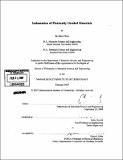| dc.contributor.advisor | Subra Suresh. | en_US |
| dc.contributor.author | Choi, In-Suk, Ph. D. Massachusetts Institute of Technology | en_US |
| dc.contributor.other | Massachusetts Institute of Technology. Dept. of Materials Science and Engineering. | en_US |
| dc.date.accessioned | 2008-11-10T19:49:26Z | |
| dc.date.available | 2008-11-10T19:49:26Z | |
| dc.date.copyright | 2007 | en_US |
| dc.date.issued | 2007 | en_US |
| dc.identifier.uri | http://dspace.mit.edu/handle/1721.1/38587 | en_US |
| dc.identifier.uri | http://hdl.handle.net/1721.1/38587 | |
| dc.description | Thesis (Ph. D.)--Massachusetts Institute of Technology, Dept. of Materials Science and Engineering, 2007. | en_US |
| dc.description | Includes bibliographical references (p. 115-126). | en_US |
| dc.description.abstract | The introduction of certain controlled gradients in plastic properties is known to promote resistance to the onset of damage at contact surfaces during some tribological applications. Gradients in composition, microstructure and plastic properties can also be deleterious to contact-damage resistance in some situations. In order to realize such potentially beneficial or deleterious effects of plastic property gradients in tribological applications, it is essential first to develop a comprehensive understanding of the effects of yield strength and strain hardening exponent on frictionless normal indentation. To date, however, systematic studies of plasticity gradient effects on indentation response have not been completed. A comprehensive parametric study of the mechanics of indentation of plastically graded materials is completed in this work by recourse to finite element (FE) computations. On the basis of a large number of detailed computational simulations, a general methodology for assessing instrumented indentation response of plastically graded materials is formulated so that quantitative interpretations of depth-sensing indentation experiments could be performed. The specific case of linear gradient in yield strength is explored in detail. | en_US |
| dc.description.abstract | (cont.) The FE analysis leads to a universal dimensionless function to predict load displacement curves for plastically graded engineering materials. Experimental validation of the analysis is performed by choosing the model system of an electrodeposited nanostructured Ni-W alloy, where the plastic property variation is introduced through a linear variation in grain size with distance through the thickness. The universal dimensionless function is shown to correlate with the shield factor which is used to predict crack behavior at the interface of plastically graded materials. Here in this work a general framework is proposed for the indentation of plastically graded materials based on energetic considerations. Possible mechanisms underlying indentation size effects are also explored including the surface energy terms in the proposed energy based framework so as to rationalize a broad range of experimental observations. Practical implications of the present work are highlighted. | en_US |
| dc.description.statementofresponsibility | by In-Suk Choi. | en_US |
| dc.format.extent | 126 p. | en_US |
| dc.language.iso | eng | en_US |
| dc.publisher | Massachusetts Institute of Technology | en_US |
| dc.rights | M.I.T. theses are protected by
copyright. They may be viewed from this source for any purpose, but
reproduction or distribution in any format is prohibited without written
permission. See provided URL for inquiries about permission. | en_US |
| dc.rights.uri | http://dspace.mit.edu/handle/1721.1/38587 | en_US |
| dc.rights.uri | http://dspace.mit.edu/handle/1721.1/7582 | en_US |
| dc.subject | Materials Science and Engineering. | en_US |
| dc.title | Indentation of plastically graded materials | en_US |
| dc.type | Thesis | en_US |
| dc.description.degree | Ph.D. | en_US |
| dc.contributor.department | Massachusetts Institute of Technology. Department of Materials Science and Engineering | |
| dc.identifier.oclc | 156821768 | en_US |
